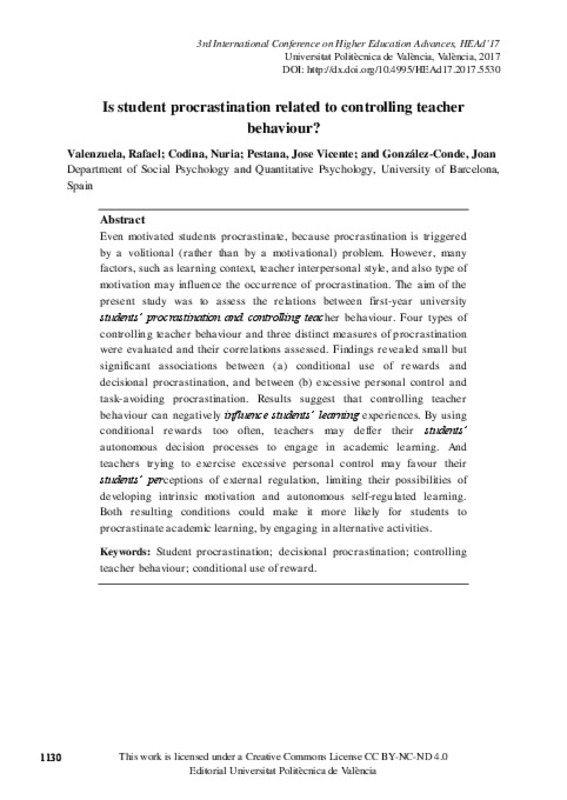JavaScript is disabled for your browser. Some features of this site may not work without it.
Buscar en RiuNet
Listar
Mi cuenta
Estadísticas
Ayuda RiuNet
Admin. UPV
Is student procrastination related to controlling teacher behaviours?
Mostrar el registro sencillo del ítem
Ficheros en el ítem
| dc.contributor.author | Valenzuela, Rafael
|
es_ES |
| dc.contributor.author | Codina, Nuria
|
es_ES |
| dc.contributor.author | Pestana, Jose
|
es_ES |
| dc.contributor.author | González-Conde, Joan
|
es_ES |
| dc.date.accessioned | 2018-06-14T07:49:12Z | |
| dc.date.available | 2018-06-14T07:49:12Z | |
| dc.date.issued | 2017-06-26 | |
| dc.identifier.isbn | 9788490485903 | |
| dc.identifier.uri | http://hdl.handle.net/10251/104026 | |
| dc.description.abstract | [EN] Even motivated students procrastinate, for procrastination is triggered by a volitional (rather than by a motivational) problem. However, many factors, such as learning context, teacher interpersonal style, and also type of motivation may influence the occurrence of procrastination. The aim of the present study was to assess the relations between first-year university students’ procrastination and controlling teacher behaviour. Four types of controlling teacher behaviour and three distinct measures of procrastination were ecvaluated and their correlations assessed. Findings revealed small but significant associations between (a) conditional use of rewards and decisional procrastination, and between (b) excessive personal control and procrastination linked to avoiding tasks. Results suggest that controlling teacher behaviours might influence students’ psychological experiences in learning negatively. Teachers who do not refrain from constant use of conditional rewards may deffer students’ decision processes regarding their own autonomous academic learning, and excessive personal control may favour students’ perceptions of external regulations, decreasing intrinsic motivation and autonomous self-regulated learning and, thus, making it more likely to engage in alternative activities, procrastinating academic learning. | es_ES |
| dc.format.extent | 8 | es_ES |
| dc.language | Inglés | es_ES |
| dc.publisher | Editorial Universitat Politècnica de València | es_ES |
| dc.relation.ispartof | Proceedings of the 3rd International Conference on Higher Education Advances | es_ES |
| dc.rights | Reconocimiento - No comercial - Sin obra derivada (by-nc-nd) | es_ES |
| dc.subject | Higher Education | es_ES |
| dc.subject | Learning | es_ES |
| dc.subject | Educational systems | es_ES |
| dc.subject | Teaching | es_ES |
| dc.subject | Student procrastination | es_ES |
| dc.subject | Decisional procrastination | es_ES |
| dc.subject | Controlling teacher behaviour | es_ES |
| dc.subject | Conditional use of reward | es_ES |
| dc.title | Is student procrastination related to controlling teacher behaviours? | es_ES |
| dc.type | Capítulo de libro | es_ES |
| dc.type | Comunicación en congreso | es_ES |
| dc.identifier.doi | 10.4995/HEAD17.2017.5530 | |
| dc.rights.accessRights | Abierto | es_ES |
| dc.description.bibliographicCitation | Valenzuela, R.; Codina, N.; Pestana, J.; González-Conde, J. (2017). Is student procrastination related to controlling teacher behaviours?. En Proceedings of the 3rd International Conference on Higher Education Advances. Editorial Universitat Politècnica de València. 1130-1137. https://doi.org/10.4995/HEAD17.2017.5530 | es_ES |
| dc.description.accrualMethod | OCS | es_ES |
| dc.relation.conferencename | Third International Conference on Higher Education Advances | es_ES |
| dc.relation.conferencedate | June 21-23,2017 | es_ES |
| dc.relation.conferenceplace | Valencia, Spain | es_ES |
| dc.relation.publisherversion | http://ocs.editorial.upv.es/index.php/HEAD/HEAD17/paper/view/5530 | es_ES |
| dc.description.upvformatpinicio | 1130 | es_ES |
| dc.description.upvformatpfin | 1137 | es_ES |
| dc.type.version | info:eu-repo/semantics/publishedVersion | es_ES |
| dc.relation.pasarela | OCS\5530 | es_ES |








